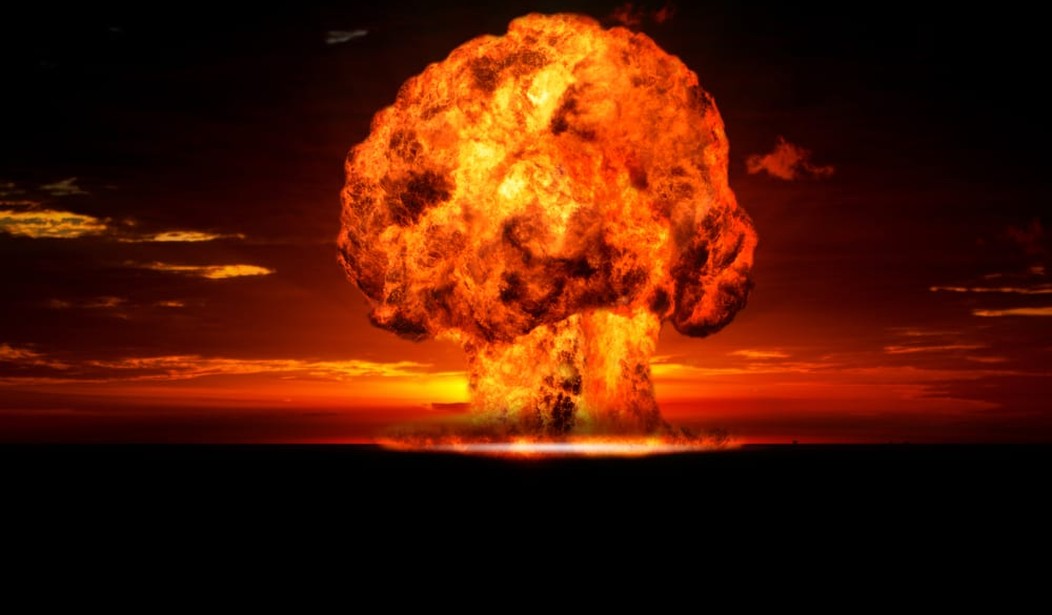In 1938, so the story goes, America nearly scared itself to death when “the Mercury Theatre on the Air enacted a Martian invasion of Earth.” Orson Welles’ radio play took the form of simulated news bulletins, but its content provoked mass hysteria. Mass hysteria is not a thing of the past and there have been numerous outbreaks since all the way into the 21st century. In 2016, an epidemic of hundreds of “evil clown” sightings in the U.S. and Canada eventually spread to ” Israel, Australia, New Zealand, Singapore, and South America.”
Mass hysteria can affect even politics, and historians cite the Red Scare as an example of how whole populations can see danger where none existed. But if mass hysteria can happen once in politics, surely it can happen again. There are indications we are living through another “scare” period, though historians have not yet given this one a name.
In early 2017, traumatized by the election of Donald Trump, some media observers concluded the West was leaderless and repeatedly proclaimed German Chancellor Angela Merkel the new Leader of the Free World.
When Barack Obama revealed that his last phone call as President was to Angela Merkel, reaffirming their alliance and friendship of the last eight years, he wasn’t just saying goodbye. He was handing over his baton. The German Chancellor isn’t just the leader of Europe, she is now the de-facto leader of the free world.
The thrice-elected, soft-spoken former scientist from East Germany, armed with a doctorate in quantum chemistry, doesn’t just carry the weight of Germany and Europe on her shoulders, but that of defending freedom and liberalism across the world.
As with the 1938 radio play, the repeated coverage fed into itself. In March of 2017, Politico headlined a meeting between Merkel and the U.S. president: “The Leader of the Free World Meets Donald Trump.” The acclamation for the German leader did not abate until September 2017, when Merkel’s party had lost so many seats in a disastrous German election her political fate was in doubt.
Since Donald Trump moved into the White House in January, many hot takes and think pieces have dubbed German chancellor Angela Merkel the new leader of the free world. This sentiment, echoed … by Hillary Clinton … [was undermined by her] party’s unexpectedly weak showing and in the frighteningly strong performance of the far-right, explicitly xenophobic Alternative for Germany (AfD).
The Economist ruefully concluded that “Germany is not the new leader of the free world.” No one seemed to consider that the position of Leader of the Free World was not an actual office but nothing more than a journalistic expression coined by Frank Capra and now replaced in general usage by the notion of the “international community”. The world continued to turn on its axis and nothing much happened.
Nearly as intense as the fear of leaderlessness was the widespread expectation that Donald Trump would start World War III as soon as he could contrive to do so. Foreign Policy‘s “Can Anyone Stop Trump If He Decides to Start a Nuclear War?”, The Hill‘s “This is how Trump could start World War III,”, and American Progress‘ “Don’t Let Trump Start a War with North Korea” were typical of the steady drumbeat.
War was coming. We were all going to die. That is, if Trump’s repeal of net neutrality did not get us first.
But in point of fact, not a single new war involving the United States started in 2017. There was not even a single new war in 2017 by anyone at all. There were a total of 33 U.S. military deaths in the administration’s first year, up from 26 in the last year of the previous administration, in part due to a final push on the last ISIS strongholds. But according to National Public Radio, 2017 was the year 600,000 Syrian refugees returned home in the first seven months of the year alone.
It might be reasonable to conclude that the fear of World War III, like leaderlessness, was slightly overblown.
Nevertheless, people kept worrying about Killer Clowns. The idea that we’re all gonna die has lost none of its force. Following a comic opera incident in which a Hawaii bureaucrat triggered a missile attack alert by accidentally pushing the wrong button, New York Times editor Max Fisher, in an extraordinary series of tweets, explained that it “put the whole world in danger” because Donald Trump has created an atmosphere where nuclear war can take place at any time.
You need to know the story of KAL-007, a Korean airliner shot down in 1983, to understand why those 38 minutes in Hawaii put the whole world in danger. …
The Americans in 1983 had been repeatedly threatening to launch some kind of attack on the USSR — just as the Trump admin is doing with North Korea today. Some in Moscow were convinced this was it, cover for what DC had promised to do….
Nuclear weapons are unspeakably dangerous. But their greatest dangers come from uncertainty and human fallibility. …
The Trump administration has deliberately engineered high levels of nuclear uncertainty on the Korean peninsula. Most think it’s a bluff. But this comes with risks. …
Officials say the emergency alert warning Hawaiians of a “ballistic missile threat” was a false alarm.
Some texted their loved ones, while others helped children into storm drains. Here’s how residents of Hawaii reacted during the half hour it took officials to identify the the “ballistic missile threat” as a false alarm.
This ignores the fact that countries do not launch nuclear missiles simply because a civil defense alert is sounded in Honolulu, but on warnings of incoming tracks from ballistic missile early warning radar. The KAL-007 incident that Fisher cites resulted from a physical intrusion into Russia’s air defense zone and can hardy be compared to the Hawaii farce, where neither Russia’s main radar net nor its new extensions on the North Korean border could have detected any incoming threats from Hawaii (because there weren’t any).
Maybe we’re all gonna die, but it’s probably not for the reasons cited by Fisher.
If it were not for the fact that mass hysteria distorts our sense of proportion, the Killer Clown sightings might actually be slightly entertaining. But it clouds our sense of judgment and therein lies its mischief. In retrospect, it is easy to see that an invasion from Mars was the least of mankind’s troubles in 1938. In March of that year, Hitler annexed Austria in the Anschluss. In September, Neville Chamberlain arrived in Berchtesgaden to begin negotiations with Hitler over the Sudetenland. Less than a year after Orson Welles interrupted the dance music of an innocent America to make a special announcement about “an unusual object falling on a farm in Grover’s Mill, New Jersey,” the Second World War would begin.
The real peril is cheapened by the imaginary one. The actual warning is blunted by the fake. If there is one unequivocal danger those “38 minutes in Hawaii” engendered, it is desensitization. The next time the missile alarm is sounded — possibly on the occasion of the real thing — thousands are doubtless going to say “well, there go those morons crying wolf again.”
As Stephen King wrote in his book about killer clowns, “we lie best when we lie to ourselves.”
Follow Wretchard on Twitter
For a list of books most frequently purchased by readers, visit my homepage.
Support the Belmont Club by purchasing from Amazon through the links below.
Books:
Thomas Jefferson: The Art of Power, by Jon Meacham. Thomas Jefferson hated confrontation, and yet his understanding of power and of human nature enabled him to move men and to marshal ideas, to learn from his mistakes, and to prevail. Meacham gives us Jefferson the politician and president, a great and complex human being forever engaged in the wars of his era. Philosophers think; politicians maneuver. Jefferson’s genius was that he was both and could do both, often simultaneously. Such is the art of power.
The Case for Christ: A Journalist’s Personal Investigation of the Evidence for Jesus, Retracing his own spiritual journey from atheism to faith, author Lee Strobel, former legal editor of the Chicago Tribune, cross-examines a dozen experts who are recognized authorities in their own fields. He challenges them with questions like, How reliable is the New Testament? Does evidence for Jesus exist outside the Bible? Is there any reason to believe the resurrection was an actual event? The book reads like a captivating, fast-paced novel but it’s not fiction. It’s a riveting quest for the truth about history’s most compelling figure.
Ghost Soldiers: The Epic Account of World War II’s Greatest Rescue Mission, by Hampton Sides. On January 28, 1945, 121 hand-selected U.S. troops slipped behind enemy lines in the Philippines. Their mission: March 30 rugged miles to rescue 513 POWs languishing in a hellish camp, among them the last survivors of the infamous Bataan Death March. This book vividly re-creates this daring raid, offering a minute-by-minute narration that unfolds alongside intimate portraits of the prisoners and their lives in the camp.
The Square and the Tower: Networks and Power, from the Freemasons to Facebook, by Niall Ferguson. The 21st century has been hailed as the Networked Age. But in this book, Ferguson argues that social networks are nothing new. From the printers and preachers who made the Reformation to the freemasons who led the American Revolution, it was the networkers who disrupted the old order of popes and kings. Far from being novel, our era is the Second Networked Age, with the computer in the role of the printing press. Once we understand this, both the past and the future start to look very different indeed. Ferguson offers a whole new way of imagining the world.
For a list of books most frequently purchased by readers, visit my homepage.
Did you know that you can purchase some of these books and pamphlets by Richard Fernandez and share them with your friends? They will receive a link in their email and it will automatically give them access to a Kindle reader on their smartphone, computer or even as a web-readable document.
The War of the Words, Understanding the crisis of the early 21st century in terms of information corruption in the financial, security and political spheres
Rebranding Christianity, or why the truth shall make you free
The Three Conjectures, reflections on terrorism and the nuclear age
Storming the Castle, why government should get small
No Way In at Amazon Kindle. Fiction. A flight into peril, flashbacks to underground action.
Storm Over the South China Sea, how China is restarting history in the Pacific
Tip Jar or Subscribe or Unsubscribe to the Belmont Club










Join the conversation as a VIP Member